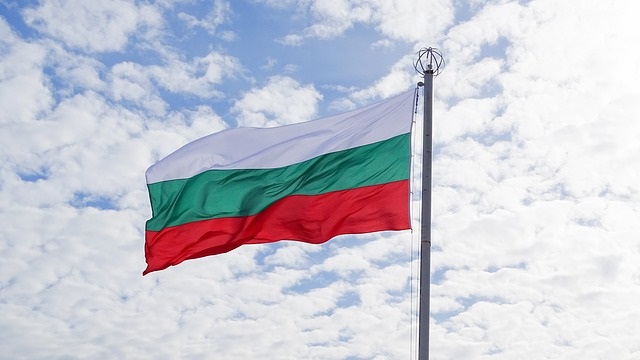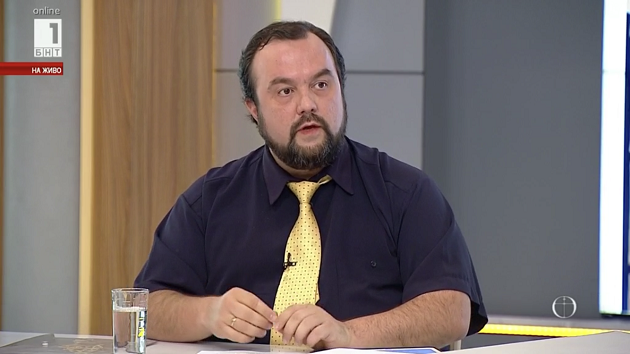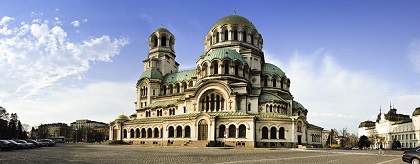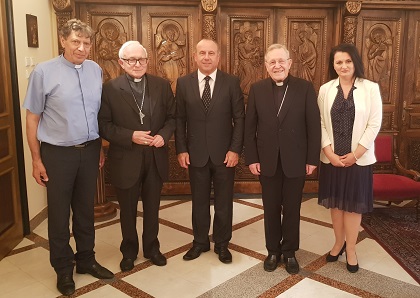Bulgarian evangelicals worried about “restrictive and discriminative” bill on faith minorities
All ministers of faith minorities representing less than 1% of the population “would be required to be Bulgarian citizens, having graduated theology in this country”, explains Vlady Raichinov, Vice President of the Bulgarian Evangelical Alliance.
SOFIA · 28 JUNE 2018 · 16:00 CET

Bulgaria could soon strongly restrict the freedoms of all minority faith groups representing less than 1% of the population.
If the bill changing the “Religious Denominations Act” of 2002 is passed, evangelical Christians and other groups would not be allowed to have foreign ministers leading their religious services.
In addition, “the state is implementing restrictions over international donations and is placing itself in a position to control any training of ecclesiastic leadership”, explains Vlady Raichinov, Bible teacher in a Baptist church in Sofia, and Vice President of the Bulgarian Evangelical Alliance.
The new law “is supposedly aiming to limit and filter attempts for radical influence”, but it would end up reinforcing the power of the two majority religions: Eastern Orthodox Christianity and Islam.

“Should an Evangelical denomination want to train its clergy, the only academic education allowed would be either in a national Eastern Orthodox academy, or in a Muslim school”, Raichinov explains.
Several Christian faith minorities have issued statements demanding political parties to open an honest dialogue with the confessions.
Vlady Raichinov analysed the situation in an interview with Evangelical Focus.
Question. What are the changes that are being introduced in the “Religious Denominations Act”?
Answer. In the first days of May, 2018, two new bills were submitted in Parliament regarding Bulgaria’s Religious Law. The first one was put forward by the three largest political parties (one in power; and two in opposition); while the second bill was coined by the United Patriots (an alliance of nationalistic groups participating in the country’s government).
The most disconcerting one is the first bill. It was drafted by the pro-European governing party GERB and their parliamentary rivals of the Socialist Party and the pro-Muslim Movement for Rights and Freedoms. This bill claims its goal to “prevent interference of foreign countries, institutions and persons into [national] religious affairs”. The document proposed several changes to the existing 2002 Act: only religious communities having at least 1% of the population would have a right to state subsidy; all clerics would be required to be Bulgarian citizens, having graduated theology in this country; any financing of religious institutions from abroad would wither be banned or filtered by the state Committee of Religious Denominations.
In this way, the state is implementing restrictions over international donations and is placing itself in a position to control any training of ecclesiastic leadership. By limiting state subsidies and religious education only to religious groups over one percent, the new law is imposing an unjustifiable governmental favoritism. The only entities thus qualifying would be the Easter Orthodox Church and the Muslim religion. Atanas Slavov, Professor of Law at the University of Sofia, went on record to say about this one-percent limitation that “placing all confessions under the same common denominator is an act of discrimination”. Groups that are discriminated against with this bill, include all Protestant denominations, the Catholic church, the Armenian church, and the Jewish minority, among others.
Catholic bishop Hristo Proykov commented for Patheos website: “The legislative proposal is a sad reminder of a bygone Communist past, which we believed would no longer return”.
Q. Is there a fear in Bulgaria about foreign organisations influencing religious groups in Bulgaria and gaining influence?
A. With the current refugee situation in Europe, and with our country responsible for the Union’s outside borders, there have been all sorts of disturbing rumors and instilled fears about our way of life and our children’s future. Broadcasting agencies and the social media regularly feed us with information about terrorist threats, religious overtaking and ethnic reshaping of the continent’s culture and values.
In addition, Bulgaria is probably the state with the highest number of Muslims per capita in the European Union. According to estimates from 2017, Muslims are about 15 percent of the country’s population. However, for many decades the relations between Muslims and Christians in Bulgaria have been peaceful and mutually respectful. On a local level, people have lived together, celebrating each other’s cultural and ethnic traditions.
The government’s concern in suggesting those restrictive measures, apparently, is that there have been endeavors on behalf of Islamic fundamental groups to infiltrate some Muslim communities in Bulgaria. Based on such anxieties, the new law is supposedly aiming to limit and filter attempts for radical influence.
Q. How would these legal changes affect evangelical churches in Bulgaria in practice?
A. According to the 2011 national census, all Evangelical Christians in Bulgaria comprise less than one percent of the population. This means that with the implementation of the new law, Protestants will be deprived on several levels. In fact, it is our belief that Protestants are actually more than one percent of Bulgaria’s population. But this is a whole different conversation.
There are at least five areas how this new bill would inspire discrimination if voted for:
First, the motives of the new bill include the argument that it aims “to stop all activities... that are aimed against the national security, the social order, the public health and moral”. This claim indirectly implies that all religious groups comprising less than one percent of the population are a threat to the national security!
Second, only groups over 1% will be eligible to receive state subsidy for restoration of church buildings. In this aspect, all Protestant churches are immediately scratched off.
Third, any religious entity that does not meet the one percent criterion, will not be allowed to open its own theological school, and accordingly will not be able to issue any academic certificates to its graduating students. Moreover, their clergy will not have a permission to study theology abroad. In other words, according to the new bill, should an Evangelical denomination want to train its clergy, the only academic education allowed would be either in a national Eastern Orthodox academy, or in a Muslim school!

Fourth, no foreign sponsorship will be allowed to any religious organization to pay salaries to their clergy or their religious staff. The only way donations will be allowed from abroad is if they meet two requirements: the purpose of the funding can only be towards building construction or social aid; the donation itself will need a preliminary permission issued by the state Committee of Religious Denominations! In other words, no outside sponsorship will be allowed to enter Bulgaria for the operation of Christian-run medical centers, for educational activity, for publishing, for cultural events, for small business, for volunteer initiatives, etc.
Fifth, only citizens of Bulgaria will be allowed to perform religious duties. The only way a foreigner (a missionary, a preacher, a teacher, an evangelist, etc.) could conduct a worship service or preach a sermon would be if he is doing this jointly with a Bulgarian minister.
Q. Are evangelical churches talking to the Bulgarian government or political parties about possible ammendments or lines of dialogue to soften the consequences of such a law?
A. As national Evangelical Alliance, part of our objection was that absolutely no attempts were made on behalf of the politicians to consult any religious group in regard to this new bill. The same sentiment has been shared by the Armenian community, the Jewish minority, the Apostolic Nunciature of the Catholic Church. The speaker of the Orthodox Holy Synod father Nikolay Georgiev announced that the Bulgarian Orthodox Church does not agree any minority should be deprived of their rights, and that the BOC is ready to defend other denominations’ just religious cause.
Soon after the proposed bill was pushed, a number of Christian churches in the country issued declarations of protest. Denominational positions were officially published by the United Methodist Church, the Bulgarian Baptist Union, the Bulgarian Evangelical Alliance, the Central Israelite Religious Council, the Catholic Church in Bulgaria, the National Alliance “United Churches of God”, the National Council of Religious Communities in Bulgaria, as well as various civil rights organizations.
Q. How would you describe the state of religious freedom of faith minorities in Bulgaria?
A. A special organ, named National Council of Religious Communities in Bulgaria, serves the government with advisory functions. It includes representatives of the six largest religious bodies: Eastern Orthodox, Roman Catholic, Evangelical Protestant, Apostolic Armenian Christians, as well as Israelite and Islamic religions.

Currently, the country is experiencing a relative freedom of religion. One particular faith institution, the Eastern Orthodox Church, is considered “traditional” even by the nation’s constitution and thus enjoys much more freedoms, governmental support and media access.
Still, the current laws do allow freedom of religion, and there are no substantial hindrances for other faith groups to publish literature; to hold prayer meetings; to celebrate worship events; to hold seminars, trainings and conferences; to implement prison ministry; to set up mission endeavor among orphans, refugees, minorities and outcasts; to organize social work, medical facilities and soup kitchens.
Last autumn, all over the country the Evangelical Christians held special commemorative events celebrating the 500th anniversary of the beginning of the Reformation.
Bulgaria is going through a season of religious liberties. Still, there have been various reports of discrimination based on religious affiliation, belief, or practice. Harassment and intolerance of some religious groups has remained an intermittent problem. During the past years, there has been an increasing number of anti-Semitic incidents and vandalism against mosques.
Protestant minorities have signalized discrimination on the part of Bulgarian government representatives. For instance, a Baptist preacher was summoned to a local police precinct during a Bible Study in a village elderly people’s club. The service was interrupted, the people were dismissed, and the preacher was questioned by the authorities based on unsubstantiated complaints by the village Eastern Orthodox priest. Eventually, he was dismissed. But this incident is indicative of a discriminative attitude.
In general, however, Bulgarian society manages to maintain an open minded attitude to minority religious groups. This year, in March, the Shalom Jewish Organization celebrated 75 years anniversary of Bulgaria’s famous prevention of the deportation of Bulgarian Jews to Holocaust death camps.
Q. What is the social “mood” about religions at the moment in Bulgaria? Are people worried about Islam and/or other faiths that are growing, like the evangelicals?
A. Our society has lately been growing more and more atheistic. Cynical attitude of life, withdrawal from faith practices, liberal humanism and general sense of pessimism have become dominant since the turn of the century. Even more, religious groups are ridiculed and named as carriers of musty sentiments of previous ages.
There are no real signs of growing of any religious group, including Islam. Yes, for the past few decades we have seen a number of mosques pop up in many villages populated by Muslims in Bulgaria. But this has not led to a growth in mosque attendance.
The main culturally shared religion is Eastern Orthodoxy. By implication, this has been fleshed out in general dislike and mistrust towards other forms of Christianity, especially towards Evangelical churches.
The current political plans to amend the Religious Denominations Act will only strengthen the position of Eastern Orthodoxy and the Muslim religion, since they are the only two faith groups having more than one percent followers of the population.
My urgent call to all of our brothers and sisters across the world is to support our country in intercession that this new bill will not pass in Parliament. We believe that there is a distinctive difference between Church and State. They have very different tasks, and the government should resist the temptation to interfere with church life. Please pray that God would grant wisdom to our politicians and they would pull back this discriminative and restrictive bill.
ABOUT VLADY RAICHINOV

Vlady is married to his beloved best friend Katya. In March, 2017, they adopted a sweet girl named Maria, and are now in the process of adopting a second child.
Published in: Evangelical Focus - europe - Bulgarian evangelicals worried about “restrictive and discriminative” bill on faith minorities
